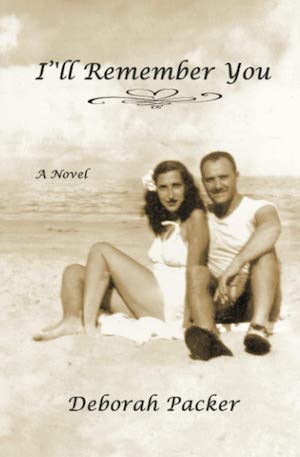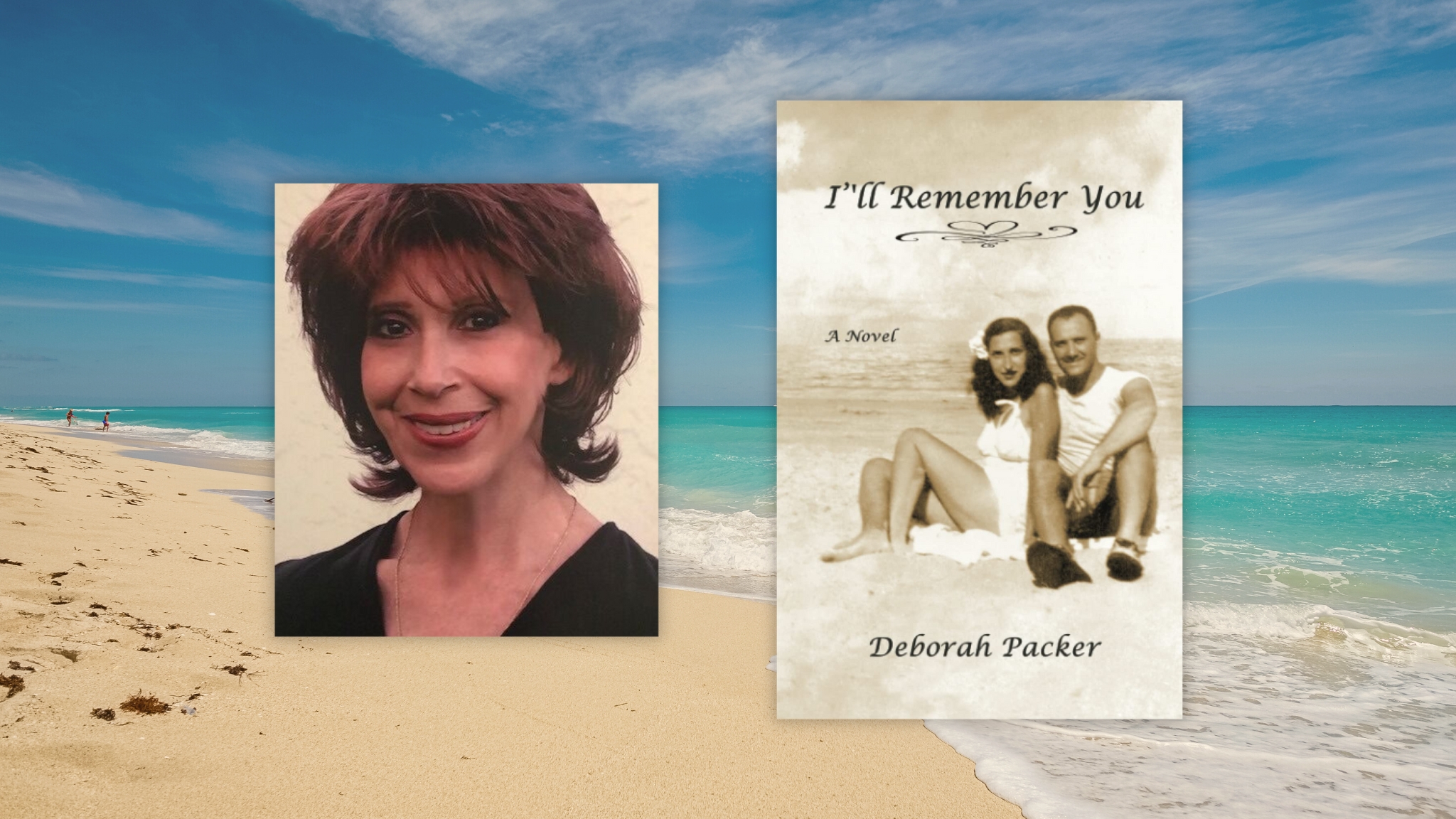I'll Remember You by Deborah Packer
Based on a true family story and set in the home front America of 1943, I’ll Remember You by Deborah Packer is a bittersweet portrait of a conflicted, wartime romance between an idealistic, proud, small-town Jewish girl and a Jewish soldier from Brooklyn with horrific memories as a child in war-torn Poland during World War I. Their relationship struggles with personal doubt, misunderstanding and childhood trauma.
This was a time of great turbulence on the home front with hasty marriages, broken promises and the uncertainty of war. The story is played out in the shadow of anti-Semitism and racism of the time — in the country itself and within the military. We were a people fighting a war to preserve democracy abroad but experiencing deep-seated hatred and intolerance at home.
The author takes us inside her work, the key themes and issues and some of the backstories in putting it together.
Q: Why did you write this book?
A: This was a family story I heard all my life. I novelized it 20 years ago after writing it first as a screenplay. I put it away due to family illness but after the horror of the Trump years and the ensuing rebirth of anti-Semitism and racism, I knew I had to finish it. Before I lost my wonderful mother in 2019, she asked me why I hadn’t done anything with it. In her honor and blessed memory, I started to work on it again to help me deal with her loss.
Q: Your book is a novel but based on a true story of a deeply human, intimate account of a conflicted wartime romance in 1943 between two strangers on the home front amidst anti-Semitism and racism. What is the true story that the work is based on, and where do you separate fact from fiction?
A: It’s about what happened when my mother went on vacation to Miami Beach in 1943 and met the soldier she would marry three weeks later. She was a small-town girl from Michigan, brought up in a conservative, middle-class Jewish family. He was a Jewish soldier from Brooklyn who had endured a horrible childhood in Poland during WWI. As an actress and writer, I have a deep interest in character development and telling a story through dialogue. There’s more truth and less fiction. The only fiction is in some of the dialogue — my take on what I was told surrounding their meeting and hasty marriage. Since I wasn’t there, I could only surmise various interactions although some were almost verbatim.
Q: Tell us about the two distinctly different perspectives from which the book is written.
A: I approach everything as an actor with a deep interest in psychology. What were their motivations? How do these two people personally deal with their own past experiences? Bobbie and Murray were very different people who saw things through the spectrum of their own lives. Bobbie’s beliefs and judgments come from her childhood experiences. She brought her own doubts and insecurities as a lonely Jewish child from a small town to a relationship with a complicated stranger in an extraordinary time. Murray’s perspective was that of a child who had seen war, emigrated as a nine-year-old, settling in Brooklyn in the early ’20s — a soldier training for war, but expecting that, because of his horrific childhood, he wasn’t coming home. All the characters have their own unique perspectives.
Q: What kinds of communication problems existed between Bobbie and Murray, and how did this affect their relationship?
A: That generation wasn’t as open as ours re: feelings, especially, considering there was a war on and Murray was going overseas to fight in it. People kept their thoughts close to their vests. Neither of the two main characters was able to open up to the other. That produced doubt and misunderstanding. Their thoughts were expressed privately through the use of italics. It’s only toward the end of the novel that they reach a new plateau in their fragile relationship when Murray confronts a bigot in a restaurant in North Carolina.
Q: Your book addresses some heavy themes: anti-Semitism, racism and the uncertainty of war. Tell us how you went about dissecting those themes, and how careful did you have to be given the volatility and sensitivity of those issues?
A: I taught Holocaust history in the original museum of the Simon Wiesenthal Center in LA. That period fascinated me, but I also knew about what my family had experienced. My uncle was involved in a drama on Broadway attempting to warn the country about what was happening to Jews in Europe. My mother lived only miles from a church whose radio priest, Father Coughlin, ranted against Jews on the airwaves in the late ’30s, and my father had his own issues with anti-Semitism as a child in Poland, on the streets of Brooklyn and in the Army. There are scenes that, because it’s called “historical fiction,” seem to be invented. Trust me. They were not. If I had to place this story into a different genre, it would be called a “non-fiction novel,” but that term isn’t used nowadays.
Q: What was the most challenging scene in the book for you to write?
A: Probably, it would be some of the difficult situations when Murray was confronted with bigotry and hate as a child and then in the Army Air-Corps. Also, there was a scene in their hotel room the night of their marriage. Most daughters might have a problem there. My mother’s wonderful sense of humor helped me through that one!
Q: What do you hope readers take away from reading this book?
A: I hope they might understand more of what their own families went through, struggling with a war overseas and another war of hate and intolerance here. Readers might grasp the horror of that time in light of what we are experiencing now — a return to racism, anti-Semitism, threats to our democracy, and a violent kind of home-grown fascism. The “greatest generation” had to deal with these issues and fight a terrible war. I’m not as courageous as my amazing parents. I feel a complete sense of despair over what’s happening today. I suggest readers listen to Rachel Maddow’s podcast, ULTRA.
About Deborah Packer:
 Deborah Packer has a Bachelors and Masters Degree in Speech and Drama from the University of Michigan, where she received a Professional Theatre Program fellowship to work with the APA Repertory Company and the American Conservatory Theatre in their days on the Ann Arbor campus. Her first professional job was playing Helen Hayes’ daughter in a production of Right You Are by Pirandello. Since then, she has worked as an actress on stage, film and TV in Los Angeles and Toronto. She has written and performed sketch comedy in LA and New York and has written two screenplays. I’ll Remember You is her first novel, which she developed from her original screenplay of the same name about a very conflicted and whirlwind relationship between two strangers, set during 1943 home front America amid the anti-Semitism and racism of the times.
Deborah Packer has a Bachelors and Masters Degree in Speech and Drama from the University of Michigan, where she received a Professional Theatre Program fellowship to work with the APA Repertory Company and the American Conservatory Theatre in their days on the Ann Arbor campus. Her first professional job was playing Helen Hayes’ daughter in a production of Right You Are by Pirandello. Since then, she has worked as an actress on stage, film and TV in Los Angeles and Toronto. She has written and performed sketch comedy in LA and New York and has written two screenplays. I’ll Remember You is her first novel, which she developed from her original screenplay of the same name about a very conflicted and whirlwind relationship between two strangers, set during 1943 home front America amid the anti-Semitism and racism of the times.
This is so much more than a typical home front love story. Packer’s work with the American Jewish Committee and the National Conference on Soviet Jewry right after college, and her affiliation with the Simon Wiesenthal Center in Los Angeles in later years, gave her the understanding and helped her to explore more thoroughly in novel form the heavy hate and prejudice that was going on in her own country during that period, especially as it affected her own family. I’ll Remember You is based on a true story.
RELATED POSTS:





